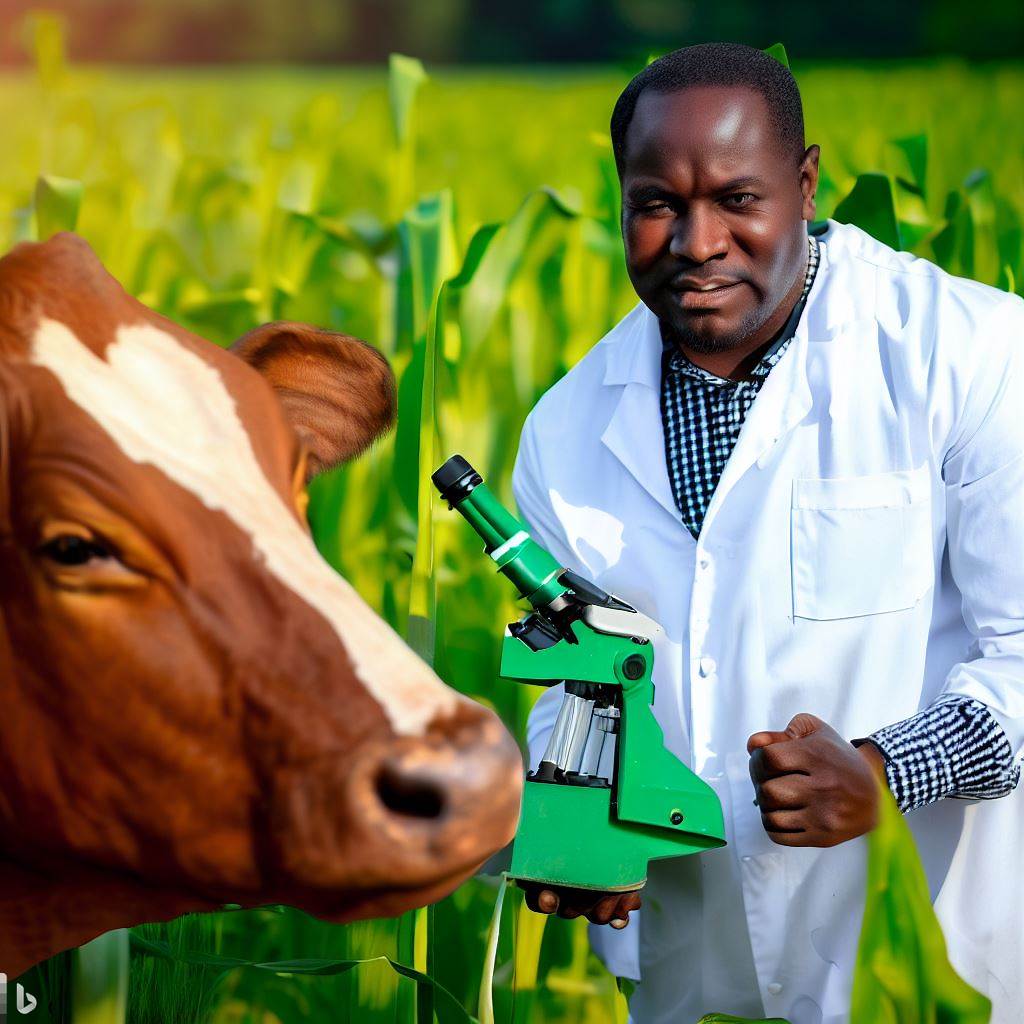Introduction
Animal geneticists are scientists who study the genetic makeup of animals. Animal geneticists play a crucial role in Nigeria as they contribute to the improvement of animal breeds and agricultural productivity.
Thesis statement
Animal geneticists in Nigeria face various challenges while carrying out their work.
Animal geneticists in Nigeria are confronted with numerous challenges that hinder their research and progress.
These challenges affect their ability to make significant contributions to animal breeding and agriculture in the country.
One of the major obstacles faced by animal geneticists in Nigeria is a lack of adequate funding. Insufficient financial support restrains research activities such as genetic studies and fieldwork.
Without proper funding, animal geneticists struggle to acquire necessary equipment, conduct experiments, and hire skilled personnel, hindering their ability to make advancements.
Limited infrastructure also poses a significant challenge. Many research facilities lack modern equipment and technology required for advanced genetic analysis.
This deficiency hampers the efficiency and accuracy of data collection and analysis, impeding the progress of animal geneticists in Nigeria.
Additionally, inadequate collaboration among researchers is another major hurdle.
Limited networking and communication between different research institutions and professionals prevent the sharing of knowledge and resources.
This lack of collaboration obstructs the exchange of ideas, slows down progress, and limits the impact of animal geneticists’ work.
Furthermore, regulatory constraints and governmental bureaucracy create obstacles for animal geneticists.
Lengthy approval processes and excessive paperwork increase the time and effort required to conduct research.
These bureaucratic hurdles significantly slow down progress and discourage many animal geneticists.
In the end, animal geneticists in Nigeria face numerous challenges that hinder their ability to make significant contributions to animal breeding and agricultural development.
Addressing these challenges through increased funding, improved infrastructure, enhanced collaboration, and streamlined regulations will enable animal geneticists to overcome these obstacles and contribute more effectively to the advancement of animal genetics in Nigeria.
Limited funding and resources
Lack of financial support from the government and organizations
- Animal geneticists in Nigeria face the challenge of limited funding for their research.
- The government and organizations do not provide sufficient financial support to animal geneticists.
- This lack of funding hinders the progress and growth of animal genetic research in Nigeria.
Insufficient resources to conduct research and experiments
- Animal geneticists in Nigeria struggle to find adequate resources for their research and experiments.
- Limited resources such as laboratory equipment, animal samples, and data analysis tools hinder their work.
- Without sufficient resources, animal geneticists face difficulties in advancing their research and making significant discoveries.
Difficulty in acquiring advanced technologies and equipment
Animal geneticists in Nigeria encounter challenges in obtaining advanced technologies and equipment. Lack of funds and limited access to modern technologies hinder the progress of their research.
Without access to the latest technologies, animal geneticists struggle to keep up with international research standards. This creates a gap between Nigerian animal geneticists and their counterparts in other countries.
In fact, animal geneticists in Nigeria face significant challenges due to limited funding and resources. The lack of financial support from the government and organizations hinders their research progress.
Additionally, the insufficiency of resources such as equipment and materials makes it difficult for them to conduct experiments.
Moreover, the difficulty in acquiring advanced technologies further hampers their work.
Addressing these challenges is crucial to foster the growth of animal genetic research in Nigeria and ensure its competitiveness on a global scale.
Read: Exploring Animal Geneticist Salary Scale in Nigeria
Inadequate infrastructure
Inadequate infrastructure is a major challenge faced by animal geneticists in Nigeria. This hinders their ability to conduct research and make significant contributions to the field.
Lack of modern laboratories and facilities
Animal geneticists in Nigeria struggle with outdated and insufficient laboratory equipment and facilities. This hampers their ability to conduct experiments and analyze genetic data effectively.
Despite these challenges, animal geneticists in Nigeria are finding innovative ways to overcome them and contribute to the field.
They have established collaborative networks with international research institutions to access modern laboratories and facilities.
Limited access to high-quality research materials
Animal geneticists often face difficulties in accessing high-quality research materials, such as DNA sequencing kits and specialized reagents.
This restricts their ability to perform advanced genetic analyses and make meaningful discoveries.
Additionally, advancements in technology are helping animal geneticists in Nigeria overcome some of these infrastructure challenges.
The use of portable DNA sequencers and field-friendly equipment allows them to carry out genetic research in remote areas with limited resources.
Inefficient transportation and logistics
Animal geneticists are also working towards improving the availability of high-quality research materials by partnering with local and international suppliers.
Efforts are being made to establish partnerships with private enterprises and government bodies to address the infrastructure gaps and improve access to modern research facilities.
The poor transportation and logistics infrastructure in Nigeria can pose challenges for animal geneticists.
Timely delivery of research materials, samples, and equipment can be a major issue, resulting in delays and hindrances to their work.
Furthermore, capacity building programs and training workshops are being organized to enhance the skills of animal geneticists in Nigeria.
These aim to equip them with the knowledge and expertise to overcome infrastructure limitations and conduct high-quality research.
In short, inadequate infrastructure poses significant challenges for animal geneticists in Nigeria.
The lack of modern laboratories and facilities, limited access to high-quality research materials, and inefficient transportation and logistics hinder their progress.
However, efforts are being made to address these challenges through collaborations, technological advancements, and capacity building programs.
With continued support and investment, animal geneticists in Nigeria can overcome these infrastructure limitations and make significant contributions to the field.
Read: Job Outlook for Animal Geneticists in Nigeria
Lack of awareness and public support
Limited public knowledge about the role of animal geneticists
Animal geneticists in Nigeria face several challenges, one of which is the lack of awareness and support from the public.
There is limited knowledge among the general population regarding the crucial role that animal geneticists play in advancing livestock production and breeding techniques.
Many people are not aware that animal geneticists are responsible for conducting research and implementing breeding programs aimed at improving the genetic traits of animals, such as disease resistance, meat quality, and fertility.
This lack of awareness leads to a low appreciation for the work done by these professionals and a limited understanding of their impact on the agricultural sector.
Inadequate support from policymakers and government officials
In addition to the lack of awareness among the public, animal geneticists also face challenges due to inadequate support from policymakers and government officials in Nigeria.
The field of animal genetics often does not receive the recognition and attention it deserves in policy discussions and resource allocation.
This lack of support hampers the ability of animal geneticists to conduct their research and implement effective breeding programs.
Without the necessary resources, they are limited in their capacity to address the genetic challenges faced by livestock farmers in the country.
This further exacerbates the problems faced by the agricultural sector, such as low productivity and low-quality animal products.
Challenges in creating public awareness programs
Another obstacle faced by animal geneticists in Nigeria is the difficulty in creating public awareness programs.
Due to limited funding and resources, it is challenging to design and implement effective campaigns that educate the public about the importance of animal genetics.
Additionally, reaching a wide audience and disseminating the message about the role of animal geneticists is a challenge in itself.
The vastness of Nigeria’s population and the diversity of communities make it challenging to ensure that the message reaches all corners of the country.
Furthermore, cultural beliefs and practices related to livestock breeding and genetics also pose barriers to raising awareness.
Some traditional methods may be deeply ingrained, making it difficult to convince farmers and communities to adopt new breeding techniques and seek assistance from animal geneticists.
In general, animal geneticists in Nigeria face significant challenges regarding awareness and public support.
Limited public knowledge about their role, inadequate support from policymakers, and difficulties in creating awareness programs hinder the progress of this field.
Addressing these challenges is crucial for the development of sustainable and efficient livestock production in Nigeria.
Read: Education Pathways for Nigerian Animal Geneticists

Shortage of qualified professionals
Insufficient number of animal geneticists in Nigeria
There is a significant shortage of qualified animal geneticists in Nigeria. This shortage can be attributed to various factors, including a lack of educational programs specialized in animal genetics.
Animal genetics is a niche field, and not many professionals choose it as a career path. As a result, there is a limited pool of qualified individuals who can contribute to genetic research and breeding programs.
Brain drain due to attractive opportunities abroad
Nigeria also faces the challenge of brain drain in the field of animal genetics.
Many talented individuals choose to pursue opportunities abroad, where they may find more attractive research prospects or higher salaries.
This brain drain further exacerbates the shortage of qualified professionals within the country. The loss of these skilled individuals hampers the progress and development of animal genetic research in Nigeria.
Difficulty in attracting and retaining talented professionals
Even for those who choose to stay in Nigeria, attracting and retaining talented professionals in the field of animal genetics is a formidable challenge.
The field requires specialized knowledge and expertise, which may not be adequately rewarded or recognized within the country.
As a result, many skilled individuals seek opportunities in other fields or switch careers altogether.
The lack of proper incentives and support systems contributes to the difficulty in retaining talented animal geneticists.
To address this challenge, Nigeria needs to invest in educational programs, research facilities, and competitive compensation packages.
By providing better opportunities and support, the country can encourage more individuals to pursue careers in animal genetics.
Nigeria should also work on creating a conducive environment that fosters innovation and collaboration within the field.
Furthermore, partnerships with international organizations and universities can help attract and retain talented professionals in the country.
Collaborative research projects and exchange programs can provide valuable exposure and opportunities for Nigerian animal geneticists.
In conclusion, Nigeria is facing significant challenges in the field of animal genetics due to a shortage of qualified professionals.
The insufficient number of animal geneticists, brain drain, and difficulty in attracting and retaining talent pose obstacles to genetic research and breeding programs in the country.
However, with strategic investments, incentives, and partnerships, Nigeria can overcome these challenges and build a stronger animal genetics industry.
Read: How to Become an Animal Geneticist in Nigeria
Ethical and cultural challenges
Balancing traditional practices with modern genetic technologies
Animal geneticists in Nigeria face the challenge of integrating traditional practices with modern genetic technologies.
Traditional practices hold cultural and historical significance, but they may not always align with scientific methods. Balancing these two aspects can be difficult for researchers.
Potential conflicts between indigenous knowledge and scientific methods
Indigenous knowledge passed down through generations is valued in Nigeria. However, conflicts may arise when traditional beliefs contradict scientific methods.
Animal geneticists must navigate these conflicts while respecting cultural diversity and ensuring scientific rigour.
Ensuring ethical treatment of animals during research and testing
Animal welfare is a significant ethical concern for geneticists in Nigeria. Conducting research and testing on animals should be done with utmost care and adherence to ethical guidelines.
Animal geneticists must prioritize the welfare of animals and strive to minimize any potential harm.
See Related Content: Understanding Agronomy Products Sales in Nigeria
Legislative and regulatory hurdles
Inadequate legislation specific to animal genetics
Animal geneticists in Nigeria face numerous challenges due to inadequate legislation specifically tailored to their field.
Publish Your Professional Profile, Business or Brand
Showcase your expertise, gain trust, and boost visibility instantly on Professions.ng.
Publish NowThe absence of comprehensive laws hampers their ability to carry out their work effectively, hindering the progress of animal genetics research and development in the country.
One major issue is the lack of laws that address the ethical considerations of animal genetics.
Without clear guidelines, researchers may face ethical dilemmas regarding the use of genetically modified animals or the handling of sensitive genetic information.
The absence of legislation puts animal geneticists in a precarious position, as they must navigate ethical concerns without a solid legal framework to guide them.
Furthermore, the current legislation does not adequately protect animal geneticists’ intellectual property rights.
Intellectual property is crucial in scientific research, as it incentivizes innovation and ensures the fair distribution of benefits.
However, without proper legislation in place, animal geneticists may struggle to protect their discoveries and inventions from unauthorized use or theft.
Challenges in implementing appropriate regulations
Even when legislation exists, animal geneticists in Nigeria encounter challenges in implementing appropriate regulations.
The lack of clarity and inconsistent interpretation of existing laws create a breeding ground for confusion and hinder progress in the field.
One major problem is the absence of regulatory bodies specifically focused on animal genetics.
While general regulatory agencies may oversee certain aspects, they often lack the expertise and understanding required to address the unique challenges posed by animal genetics.
This leads to a lack of specialized guidance and oversight, impeding the effective implementation of regulations.
In addition, the lack of funding and resources dedicated to enforcing regulations further compounds the challenges faced by animal geneticists.
Without adequate support, regulatory agencies struggle to monitor and enforce compliance, allowing potential violations to go unnoticed.
This not only undermines the integrity of animal genetics research but also poses risks to public health and safety.
Lack of enforcement and monitoring mechanisms
One of the significant hurdles faced by animal geneticists in Nigeria is the lack of enforcement and monitoring mechanisms.
Even when regulations are in place, the absence of effective monitoring systems and enforcement mechanisms undermines their efficacy.
The limited capacity of regulatory agencies to carry out inspections and investigations hampers their ability to detect and address violations promptly.
This lack of oversight creates an environment where unethical practices can thrive without consequence, posing risks to animal welfare, public health, and the integrity of the field.
Moreover, the lack of public awareness and engagement on the importance of animal genetics exacerbates the enforcement challenges.
When the general public is unaware of the potential benefits of animal genetics and the necessity of regulations, there is less pressure on regulatory agencies to take action.
This perpetuates a cycle of apathy and undermines the efforts of animal geneticists to work towards sustainable and ethical practices.
All in all, animal geneticists in Nigeria face significant challenges due to inadequate legislation, difficulties in implementing appropriate regulations, and a lack of enforcement and monitoring mechanisms.
To overcome these hurdles, it is imperative for policymakers and stakeholders to work together to develop comprehensive legislation that addresses the unique ethical and intellectual property concerns of animal genetics.
Additionally, specialized regulatory bodies should be established to provide guidance and oversight, and adequate resources must be allocated to ensure effective enforcement and monitoring.
By addressing these issues, Nigeria can foster a conducive environment for the advancement of animal genetics research and development.
Conclusion
Animal geneticists in Nigeria face various challenges such as inadequate funding, lack of infrastructure, and limited research opportunities.
Overcoming these challenges is crucial for the development of animal genetics in Nigeria as it can lead to improved livestock breeds, increased agricultural productivity, and economic growth.
We must recognize the significance of animal genetics research in Nigeria and allocate proper funding and resources for its development.
Investing in this field will have long-term benefits for agriculture, food security, and the overall economy of the nation.
By supporting animal geneticists and providing them with the necessary tools and resources, Nigeria can unlock the potential of its livestock industry and make significant strides in the field of animal genetics.




